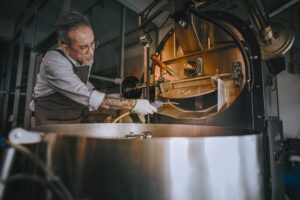Pest Control for Breweries, Distilleries and Wineries
Pests pose a significant challenge for facilities that produce beer, wine, and spirits. Pests are attracted by the distinct smells that these types of facilities emit during the brewing and distilling process.
Rodents, cockroaches, stored product pests and flying insects in search of new food, water and harborage will find breweries, distilleries and wineries to their liking. The humid conditions and abundance of liquid spillage in breweries and other beverage processing facilities make them prime targets for pests.

Pests pose a significant challenge and threat to facilities that produce beer, wine, and spirits.
A pest infestation at a brewing, distilling or bottling facility can create serious problems for management. It will create risk for the company if product becomes contaminated. This will cut into an operation’s bottom line and brand reputation if product needs to be destroyed or recalled due to a pest-related contamination issue.
And it’s not just the finished product that is at risk. Breweries, distilleries and wineries receive and store significant volumes of ingredients (i.e., grain, rice, hops, sugar, fruit, etc.) that can be damaged or contaminated during the shipping or storage process.
Professional pest control services in beverage processing and bottling facilities are essential if the plants are to keep production flowing. These facilities are under the jurisdiction of the U.S. Food and Drug Administration which requires brewing operations to institute good manufacturing practices, among them precautions to prevent product contamination from pests.
Common Brewery/Winery Pests
While many pests can threaten a beverage production facility, there are certain pests that are more likely to create problems.
Flying Insects
Flying insects can enter a beverage production facility if doors and windows are left open without any mesh installed over them and can cause serious contamination issues. Flying insects, primarily drain and fruit flies, enjoy nothing more than to have constant access to the liquids within a facility attracted to the sweet-taste compounds yeast produce when products are fermented. Whether it is a large-scale facility or smaller micro-brewery, a visit from a fly can turn into a full-blown infestation and a costly problem to remediate. This can cause major problems for your operations (see drain cleaning).
Rodents
Rats and mice are attracted to the grains that are used in beverage production operations and usually found in great abundance. The presence rodents present multiple challenges. First, passing third-party audits will not happen if rodent activity is observed during an audit or inspection. Secondly, rodents are known transmitters of harmful bacteria that can lead to food-borne illnesses, contaminate/spoil product and lead to product recalls. They can also damage equipment by chewing through wires and cables.
Cockroaches
The moisture,, constant temperature, and the starches and sugars that are typically present in a beverage production facilities can attract cockroaches. Drains, processing equipment and storage areas can be susceptible to cockroach infestations, especially if sanitation and cleaning protocols are not closely followed. They are very good at hiding and squeezing through tiny cracks to penetrate structures.
Birds
Birds present a unique challenge in any beverage production facility. They can easily navigate between properties that are miles apart and deliver pathogens (in their droppings) that contain harmful bacteria including listeria, E. coli and salmonella. These pathogens can be brought inside a facility on the sole of an employee’s shoe, on unprocessed commodities or on food processing equipment or preparation areas if the birds gain access.
Ants
Ants are another insect pest commonly found in beverage production facilities. They are very attracted to sugary smells or grease. To avoid ant infestations, clean up spillage – liquid, grain, sugar, etc. – immediately; do not let it sit and attract pests.
Drain Cleaning
Preventing and eliminating pests, especially flies in beverage production and bottling facilities is an ongoing challenge. Flies are ready transmitters of diseases such as E. coli, salmonella, or listeria as they transfer harmful bacteria to ingredients and surfaces.
Small flies including drain and fruit flies breed in stagnant liquid and organic material that builds up in clogged drains. Prolific breeders, the flies will hover in large numbers in and around their breeding location.
Proper cleaning of the drain – all the way to the drain trap where food materials and waste materials build up – and maintaining good sanitation protocols are essential to prevent flies from establishing a breeding site.
Discover The Sprague Difference
For more information on how Sprague Pest Solutions can assist you establish an effective pest prevention or management program in beverage production facilities, call 855.805.0755.

